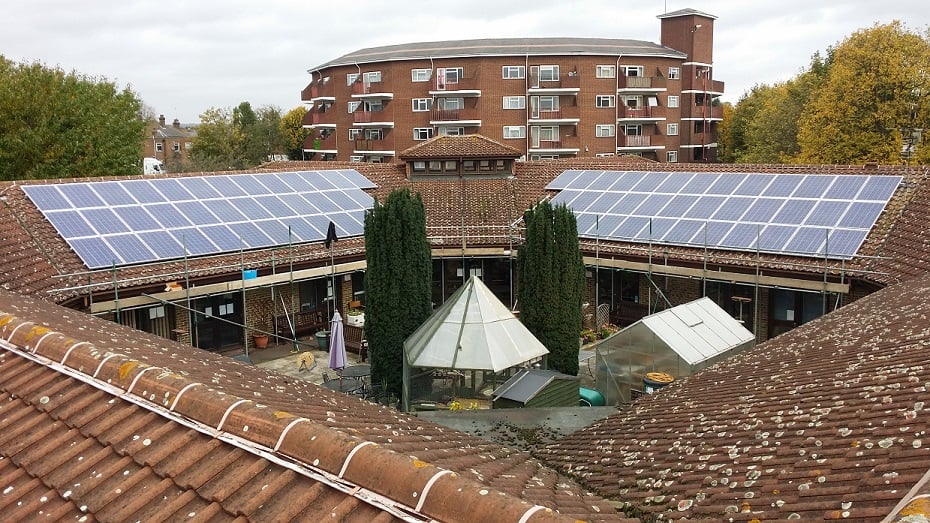
FoI requests have shown almost half of councils point to cuts to government subsidy as the main barrier to new deployment. Image: London Borough of Havering.
Over 70% of local authorities across the UK have no strategy in place to invest in solar, with almost half pointing to a lack of incentives from government as the main barrier to deploying council solar, according to a survey carried out by LG Solar.
The company sent Freedom of Information requests to 435 local authority bodies with a range of questions covering their solar strategies. Responses were received from 332, with 47% claiming reduced subsidies in recent years have left it difficult to invest in solar.
The FoI requests, sent out in December 2016, also found that only around one in five (19%) respondents plan to invest in new solar over the next six months, while more than three quarters (76%) will not despite the popularity of the technology among local authorities.
The majority (84%) already own solar panels however the research shows that government cuts have had a severe and long-lasting impact on the future deployment of public sector solar, with 70% claiming to have no plans to add to capacity for the next five years.
This was found by asking if councils had solar included within their current environmental strategy, the majority of which did not.
Bob Mills, UK senior sales manager for LG Electronics said: “To find out that lack of government support is the main barrier to further investment, is deeply saddening. Our research has revealed that the government’s policy towards solar is ineffective and in some cases, completely non-existent.
“Until there is clarity on solar strategy, we will continue to see public money wasted on out-dated and overpriced energy projects.”
The results suggest a further reduction in the opportunities for new solar deployment in the UK, with the number of new domestic feed-in tariff installs dropping to less than 2,000 in December. This followed cuts to the subsidy scheme enacted in January 2016, which caused a surge of 22,443 installs in December 2015.
Meanwhile, the ROC support scheme for large scale deployment will close next month, leaving solar on what energy minister Jesse Norman recently called was “a path to subsidy-free deployment”.
Despite this claim, large developers such as BSR and Baywa r.e. have said new large scale developments in the UK will stagnate over the next few years until module prices reduce further. In the meantime, solar farm development is likely to be remain viable through power purchase agreements or sleeving arrangements.
However, some councils have been successful in developing new solar despite diminishing subsidies, such as Swindon Borough Council which is preparing to complete its second community funded solar project.
Hounslow Council claimed in May 2016 that it had become the first local authority to incorporate battery storage into a solar project after investing £2 million to install a 1.73MW array atop Western International Market (WIM).
In the first year alone, the project is expected to reduce carbon emissions by 50% and earning the council £255,000 each year.
Charles Pipe, energy manager at London Borough of Hounslow, said: “While the Government’s dramatic cuts will impact solar deployment, there are still options available to local authorities. All energy installations must meet specific criteria and have as close to a seven-year payback as possible. Solar can meet this and more – offering immediate savings and the potential for more in the future.
“For our project at Hounslow, we expect to make several million in the next 20 years. It can and does work, councils simply need to understand that solar investment is no longer a risk.”
However, the results found that the second most cited reason for councils failing to invest in future solar was the lack of capital to front investment, suggesting a combination of cuts to subsidy and local government funding is reducing the scope for solar even further.
Council installations are expected to be further threatened by increases in business rates applied to solar scheduled for April. Devon County Council recently called on ministers to raise the issue, claiming the plans will have “a profound effect” on its own plans to install solar.

